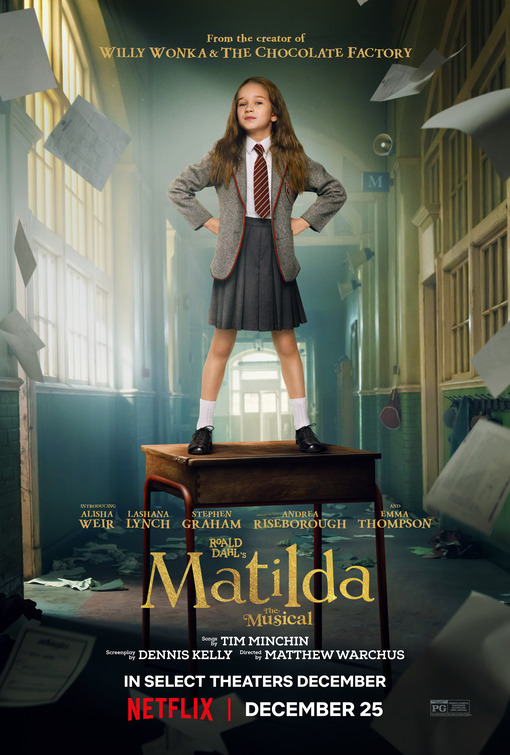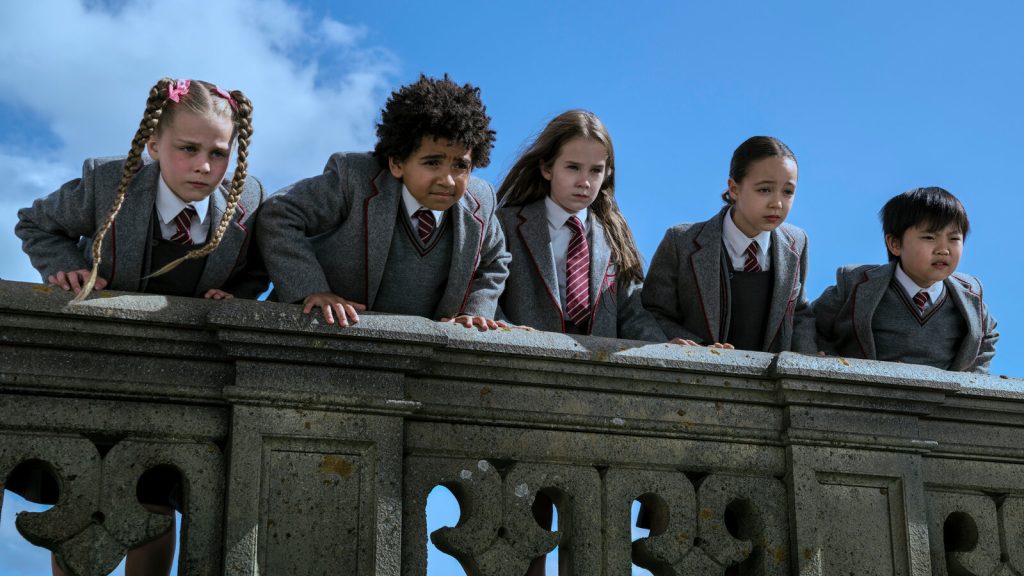
It doesn’t take a genius to understand why UK author Roald Dahl is considered a national treasure. I’m an aficionado of the legendary author’s work too. He wrote James and the Giant Peach, Charlie and the Chocolate Factory, Fantastic Mr. Fox, The BFG, and The Witches. All were made into fine films. I wasn’t as familiar with Matilda, which was published in 1988. You will likely follow this meandering account better if you’re well-versed in the original text. It has a beloved following, particularly in the UK. It’s been adapted into a 1996 film directed by Danny DeVito, a two-part special on BBC Radio 4, and a 2010 West End/Broadway musical by Tim Minchin. This is the cinematic adaptation of that musical, directed by Matthew Warchus (Pride), from a screenplay by Dennis Kelly.
Matilda the Musical is an overstuffed production with a lot of characters. Matilda Wormwood is a precocious five-and-a-half-year-old girl. Yet the child isn’t appreciated by her mom and dad. “My mummy says I’m a lousy little worm,” she laments. Her father wanted a boy and continues to refer to Matilda as one. Actors Stephen Graham and Andrea Riseborough are amusingly festooned in tacky clothes and goofy hair. I cherished their campy presence. Due to her parents’ lack of care and concern, she seeks solace at the local library. She’s a voracious reader. There she tells a parable to Mrs. Phelps (Sindhu Vee), the librarian. Matilda’s tale is about a renowned acrobat (Lauren Alexandra) and escapologist (Carl Spencer) couple who long to have a baby. Frequent cutaways dramatize this external circus saga throughout the film.
The movie finally hints at a coherent story when Matilda is admitted as a student at Crunchem Hall. The sweet but timid teacher Miss Honey (Lashana Lynch), sees her potential. It’s hard to believe this passive instructor is portrayed by the same actress who was the fierce lieutenant in The Woman King and the new 007 in No Time to Die. Talk about range. Meanwhile, Headmistress Agatha Trunchbull (Emma Thompson, unrecognizable under prosthetics) does not like kids. She considers them maggots. As a matter of fact, it’s the school’s motto. However, Matilda is a willful girl with a powerful brain that develops a knack for telekinesis. Matilda and Trunchbull are destined to face off. Any wagers on who will win?
Matilda’s personality could use tweaking. Actress Alisha Weir is indeed effective in the title role. When she sings, “Sometimes you have to be a little bit naughty,” an optimistic ode about her sad life, I felt her sorrow. To Matilda’s credit, she is surrounded by negative influences and still finds the strength to champion her fellow students. However, she comes across as a tad self-righteous and conceited. She solves a ridiculously complicated math problem to the bewildered shock of Miss Honey and shrugs it off like it’s no big deal. Then she puts on airs by listing all the novels she read that week (Nicholas Nickleby, Jane Eyre, Tess of the D’Urbervilles, Of Mice And Men, The Lord of the Rings, Moby Dick, Crime and Punishment, and…The Cat in the Hat.) We get it. You’re a prodigy, but a touch of humility goes a long way. The rebel in me was silently rooting for Agatha Trunchbull.
I miss the subversiveness of Roald Dahl. The author is weird. What makes his books so interesting is the dark sensibility that saturates his irreverent tales. His chronicles often feature a child narrator against villainous adults. Matilda is no exception. Sure the adults are evil on the written page. Agatha Trunchbull competed in the hammer throw at the ’72 Olympics. When she likewise hurls a young student by her pigtails, it is an outrageously bizarre sight., However, the scene is silly, and the savagery is ephemeral.
Dahl’s aesthetic has been considerably undermined by a bright, colorful exhibition infused with spoonfuls of saccharine sentimentality. The vigorous dance numbers are fabricated and edited within an inch of their life. One group sequence highlights jittery step patterns in detailed precision. When the youngsters dance and sing to “Revolting Children,” it is a spectacle to behold. The scene is frenzied and intense but employs slow motion, too, with CGI flying paper planes and streamers. The presentation veers from excellent to exhausting in a scant 3 minutes. I longed for the comparative calm of the earlier ditty, “When I Grow Up.”
I love musicals, but Matilda wasn’t made for fans of the golden age (the 1930s through the early 1950s). It’s for young theater geeks raised on TikTok, where the triumphant, hyper-edited, special effects-enhanced displays of choreographed demonstrations can be uploaded onto social media platforms and then go viral. The picture is best enjoyed for the production numbers. They are impressive, but they overshadow a disjointed and cluttered mess of a story. Matilda the Musical is a collection of catchy songs and high-energy dancing in search of a focused narrative.
12-26-22


9 Responses
I liked this. The songs were catchy. Choreography was fun. The little girl was probably a combination of everything she’s read, because she surely wasn’t raised by her parents. The kids were cute too. My favorite was the interaction between Mathilda and the librarian. 3 1/2 ⭐️
The choreography was indeed fun but wish the musical numbers had been filmed more in wide shots. Hard to tell how much was real and how much was aided by fast edits and closeups.
I enjoyed it. They cut a lot out of the musical which I missed but it was a fun time.
I read somewhere that the Broadway musical was 2 hours and 40 minutes. 😮 I’m glad they took stuff out. 😂
I wish they’d taken out the fantasy elements with the storytelling and left in the parents songs because they are really funny
Agreed. The storytelling felt like a distraction. The parents were my favorite part so I’ll check out the original cast album.
Loud and Telly are really funny. Shame they got cut
I thought Bruce was the highlight
Well…. I still don’t know whether to watch this or not hahaha